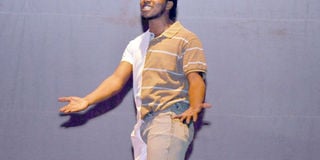Prime
Recitations beyond mere rhetoric

Patrick Massa delivering his take on the debate on good versus evil. The light half of his shirt represents good and the dark represents evil . PHOTO BY RACHEL MABALA
What you need to know:
The performers tried their best to keep true to the anthology where the poems are.
Verbal and visual expression of poems is, like watching the movie adaptation of a book, an opportunity for the performers to either dilute the imagery the written word evokes in the reader’s mind, or to give uncannily-accurate interpretations that amplify a thousand-fold the power of the word.
If one could judge a performance by the cover of its book, The Lantern Meet of Poet’s recital last Saturday evening at the National Theatre was a mostly faithful rendition of the poems in the anthology Broken Voices of the Revolution. The cover portrays a fist raised Amandla-style, towering above an onslaught of archetypical Angry Young Men brandishing writing instruments and randomly, or so it first seems, a lone catapult shooter.
The line “The ink of the scholar is better than the blood of the martyr” from Ojakol Omerio’s How We Move best contextualises the cover, the recital’s pivotal theme , and Knowledge is the Revolution, the so-fitting prologue to both the book and recital.
A drumbeat, of the sort originally a rallying cry to arms or public service, signaled the dual-intent motif running through much of the recital; of both apocalyptic ravings and the need for activist artists in transforming Uganda’s fortunes.
Doom and gloom, sometimes
Jeremiads included Lillian Ngabirano’s Rage Against The Cage and Patrick Massa’s The Revolution Will Not be Televised, while W’obusobozi Amooti Kangere’s I Remember Bongole-Lutaaya exhorted us to make our existences more proactive than reactive.
Page-to-stage offerings are, by default, susceptible to problems like audibility, which affected Murungi Judith’s performance of Jason Sabiiti Ntaro’s A Song For the Drowned Soul. Theatre lighting also cheated viewers of Mark Gordon Musinguzi’s facial expressions as he recited Peter Kagayi’s cheeky poem The Country You Would Rather Not Know About.
But performance also brings pleasant surprises like Patrick Massa’s costume-aided solo of a revised God-and-Lot debate as a redemption call customised for Uganda’s motley mix of sins public and private in Linda Orando’s Doomsday Corruption.
And then the lyricists
It brought the tight synchronicity of Moses Laku and Jason Sabiiti on Daniel Nuwamanya’s For The Lone Soldiers, Jason Sabiiti’s interactive rhetoric on Kagayi’s Thought Structure, Guy Mambo’s negritude apologetics on Cause, and Norah Byaruhanga’s confrontational radiance on Daniel Mutembesa’s Not Feel.
In 2065, Kagayi’s scathingly satiric vision of a Uganda where the only changes will be negative ones was delivered with a sardonic, hauntingly prophetic tone by Solomon Manzi. It was simultaneously funny and uncomfortable for envisioning vampire children, dysfunctional governance systems, and a taxed-to-death populace stuck in a police state with a president ruling by proxy.
But beyond the rhetoric, it framed questions of whether it will preach beyond the confines of the meet’s niche crowd who might already be converts, or whether it is content to merely echo Ayi Kwei Armah’s The Beautiful Ones Are Not Yet Born.
If they could only reach a wider audience than the practically full auditorium that graced the lone show, the 5-year old Lantern Meet will truly lay claim to cheer leading Uganda’s new poetry movement.
Only then will the transformation from poetry addicts meeting for their regular fix to town-square activists be complete.




